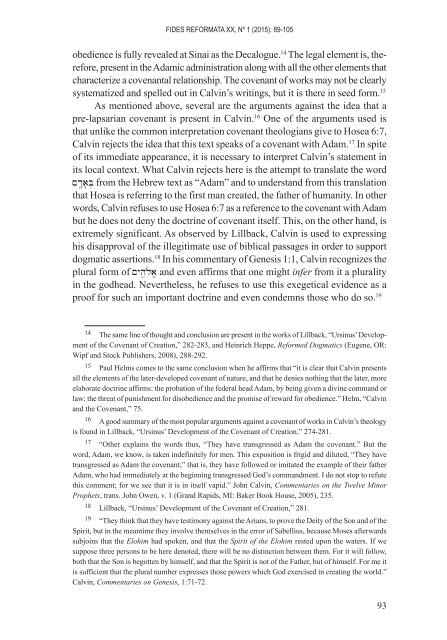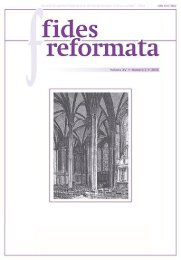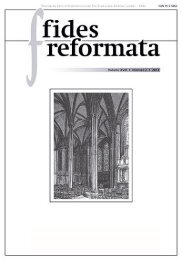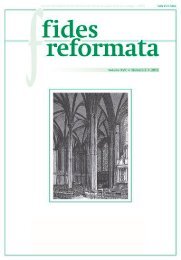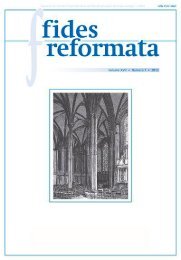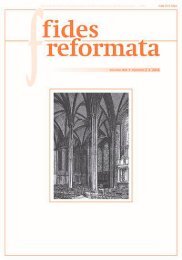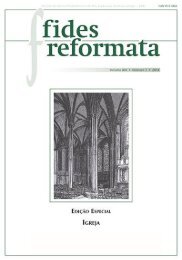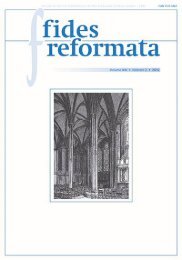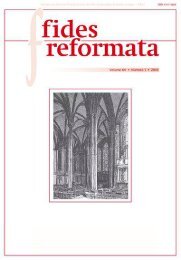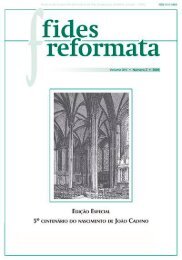You also want an ePaper? Increase the reach of your titles
YUMPU automatically turns print PDFs into web optimized ePapers that Google loves.
FIDES REFORMATA XX, Nº 1 (<strong>20</strong>15): 89-105<br />
obedience is fully revealed at Sinai as the Decalogue. 14 The legal element is, therefore,<br />
present in the Adamic administration along with all the other elements that<br />
characterize a covenantal relationship. The covenant of works may not be clearly<br />
systematized and spelled out in Calvin’s writings, but it is there in seed form. 15<br />
As mentioned above, several are the arguments against the idea that a<br />
pre-lapsarian covenant is present in Calvin. 16 One of the arguments used is<br />
that unlike the common interpretation covenant theologians give to Hosea 6:7,<br />
Calvin rejects the idea that this text speaks of a covenant with Adam. 17 In spite<br />
of its immediate appearance, it is necessary to interpret Calvin’s statement in<br />
its local context. What Calvin rejects here is the attempt to translate the word<br />
~֭d"a'B. from the Hebrew text as “Adam” and to understand from this translation<br />
that Hosea is referring to the first man created, the father of humanity. In other<br />
words, Calvin refuses to use Hosea 6:7 as a reference to the covenant with Adam<br />
but he <strong>do</strong>es not deny the <strong>do</strong>ctrine of covenant itself. This, on the other hand, is<br />
extremely significant. As observed by Lillback, Calvin is used to expressing<br />
his disapproval of the illegitimate use of biblical passages in order to support<br />
<strong>do</strong>gmatic assertions. 18 In his commentary of Genesis 1:1, Calvin recognizes the<br />
plural form of ~yh+Il{a/ and even affirms that one might infer from it a plurality<br />
in the godhead. Nevertheless, he refuses to use this exegetical evidence as a<br />
proof for such an important <strong>do</strong>ctrine and even condemns those who <strong>do</strong> so. 19<br />
14 The same line of thought and conclusion are present in the works of Lillback, “Ursinus’ Development<br />
of the Covenant of Creation,” 282-283, and Heinrich Heppe, Reformed Dogmatics (Eugene, OR:<br />
Wipf and Stock Publishers, <strong>20</strong>08), 288-292.<br />
15 Paul Helms comes to the same conclusion when he affirms that “it is clear that Calvin presents<br />
all the elements of the later-developed covenant of nature, and that he denies nothing that the later, more<br />
elaborate <strong>do</strong>ctrine affirms: the probation of the federal head Adam, by being given a divine command or<br />
law; the threat of punishment for disobedience and the promise of reward for obedience.” Helm, “Calvin<br />
and the Covenant,” 75.<br />
16 A good summary of the most popular arguments against a covenant of works in Calvin’s theology<br />
is found in Lillback, “Ursinus’ Development of the Covenant of Creation,” 274-281.<br />
17 “Other explains the words thus, “They have transgressed as Adam the covenant.” But the<br />
word, Adam, we know, is taken indefinitely for men. This exposition is frigid and diluted, “They have<br />
transgressed as Adam the covenant;” that is, they have followed or imitated the example of their father<br />
Adam, who had immediately at the beginning transgressed God’s commandment. I <strong>do</strong> not stop to refute<br />
this comment; for we see that it is in itself vapid.” John Calvin, Commentaries on the Twelve Minor<br />
Prophets, trans. John Owen, v. 1 (Grand Rapids, MI: Baker Book House, <strong>20</strong>05), 235.<br />
18 Lillback, “Ursinus’ Development of the Covenant of Creation,” 281.<br />
19 “They think that they have testimony against the Arians, to prove the Deity of the Son and of the<br />
Spirit, but in the meantime they involve themselves in the error of Sabellius, because Moses afterwards<br />
subjoins that the Elohim had spoken, and that the Spirit of the Elohim rested upon the waters. If we<br />
suppose three persons to be here denoted, there will be no distinction between them. For it will follow,<br />
both that the Son is begotten by himself, and that the Spirit is not of the Father, but of himself. For me it<br />
is sufficient that the plural number expresses those powers which God exercised in creating the world.”<br />
Calvin, Commentaries on Genesis, 1:71-72.<br />
93


